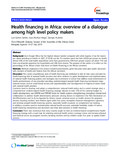Health financing in Africa: overview of a dialogue among high level policy makers

View/
Date
2011Author
Sambo, Luis Gomes
Kirigia, Joses Muthuri
Ki-Zerbo, Georges
Metadata
Show full item recordAbstract
Even though Africa has the highest disease burden compared with other regions, it has the lowest per capita spending on health. In 2007, 27 (51%) out the 53 countries spent less than US$50 per person on health. Almost 30% of the total health expenditure came from governments, 50% from private sources (of which 71% was from out-of-pocket payments by households) and 20% from donors. The purpose of this article is to reflect on the proceedings of the African Union Side Event on Health Financing in the African continent. Methods employed in the session included presentations, panel discussion and open public discussion with ministers of health and finance from the African continent. The current unsatisfactory state of health financing was attributed to lack of clear vision and plan for health financing; lack of national health accounts and other evidence to guide development and implementation of national health financing policies and strategies; low investments in sectors that address social determinants of health; predominance of out-of-pocket spending; underdeveloped prepaid health financing mechanisms; large informal sectors vis-à-vis small formal sectors; and unpredictability and non-alignment of majority of donor funds with national health priorities.Countries need to develop and adopt a comprehensive national health policy and a costed strategic plan; a comprehensive evidence-based health financing strategy; allocate at least 15% of the national budget to health development; use GFATM and PEPFAR funds for health systems strengthening; strengthen intersectoral collaboration to address health determinants; advocate among donors to implement the Paris Declaration on Aid Effectiveness and its Accra Agenda for Action; ensure universal access to health services for pregnant women, lactating mothers and children aged under five years; strengthen financial management capacities; and develop prepaid health financing systems, especially health insurance to complement tax funding. In addition, countries need to institutionalize national health accounts; undertake feasibility studies of various
health financing mechanisms; and document and share best practices in health financing.There was consensus that every country ought to have an evidence-based comprehensive health financing strategy with a road map for attaining universal health service coverage vision; and increase physical and financial access by pregnant women, lactating mothers and by children under five years to quality health services.
